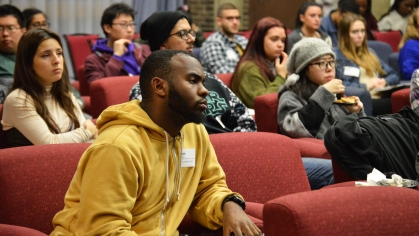Internship & Job Search Strategies for International Students
It’s important to learn and feel comfortable with the hiring culture and practices in the U.S. and how they differ from your home country. Review the roles of the U.S. employer and international student in the employment process. Play an active role in the areas you’re responsible for if you’re hoping for success. Get ready to acclimate, prepare yourself for the differences, and to show potential employers you are prepared to work in the U.S.
The U.S. Employer’s Role in the Job & Internship Search
Sometimes employers restrict hiring to U.S. citizens or permanent residents because they assume it is complicated, expensive, and time-consuming to hire international students, or they have a federal government contract. Additionally, many employers use internships to recruit for full-time positions. Although it is a less complicated process for employers to hire international students for an internship, they prefer U.S. citizens whom they could easily convert to full-time employees.
The employer’s role is to:
- Use various approaches to locate potential employees for internships and full-time employment:
- Career and internship fairs or community job fairs
- On-campus recruitment
- Employment agencies (also known as “headhunters”)
- Employee referrals
- Job announcements on company websites, job boards, major newspapers, trade publications, or professional associations
- Regional and national professional conferences
- Seek people who are the right fit for the organization and the position for which they are recruiting.
- Provide applicants with an opportunity to explain their credentials and the reasons they are suitable for a position.
*Note: Individual equality in the U.S. is important; thus, legally, factors like age, gender, and race cannot be considered in the interview process.
The International Student’s Role in the Job & Internship Search
As an internship or job seeker in the U.S., your responsibility is to pursue and apply for opportunities. It is also your responsibility to become aware of the process, and paperwork necessary to be eligible to work in the U.S. Rutgers Global offers workshops through RGlobal Portal on post-completion optional practical training (OPT), off-campus, and on-campus employment. You can also meet with your international student advisor to help you complete any necessary forms and inform you of costs associated with working in the United States.
When invited for an interview, be prepared to explain what is involved in the process for work authorization and hiring an international student for a job or internship opportunity. Employers might be interested in hiring you if you demonstrate that you are the best-qualified candidate and if no U.S. citizens can be found with the skills they seek.
The international student’s role is to:
|
Strategies |
Resources |
|---|---|
|
Become aware of the process and paperwork to be eligible for employment in the U.S. through Curricular Practical Training (CPT) and/or Optional Practical Training (OPT) |
Attend Post-Completion Optional Practical Training (OPT), Off-Campus, and On-Campus Employment Workshops offered by Rutgers Global and meet with an international student advisor to complete necessary forms. Authorization is required before any work can occur. |
|
Create and research a target list of employers for your internship and job search, based on your career and industry community, including U.S. organizations doing business in your home country and organizations that have sponsored H1B Visas in the past 12 months. |
|
|
Develop personal and professional relationships via networking. Inform as many people as possible about your job search and your field of interest. |
Use these resources to connect with alumni to conduct informational interviews:
|
|
Prepare your resume/curriculum vitae (CV) before applying for a job/internship in the U.S. Note: Do not include personal information such as age, gender, marital status, or religion. |
Have a career advisor critique your resume/curriculum vitae (CV).
|
|
Communicate your skills and experiences through your resume and the interview. |
Attend workshops on resume/CV writing, interviewing, and other job search-related topics. |
|
Speak with confidence about your skills, strengths, accomplishments, and education as they relate to the jobs you are seeking in interviews. |
|
|
Be prepared to explain in interviews what is involved in hiring an international student for employment opportunities using Curricular Practical Training (CPT) and/or Optional Practical Training (OPT). |
Attend workshops offered by:
|
|
Strengthen your English language skills. |
|


